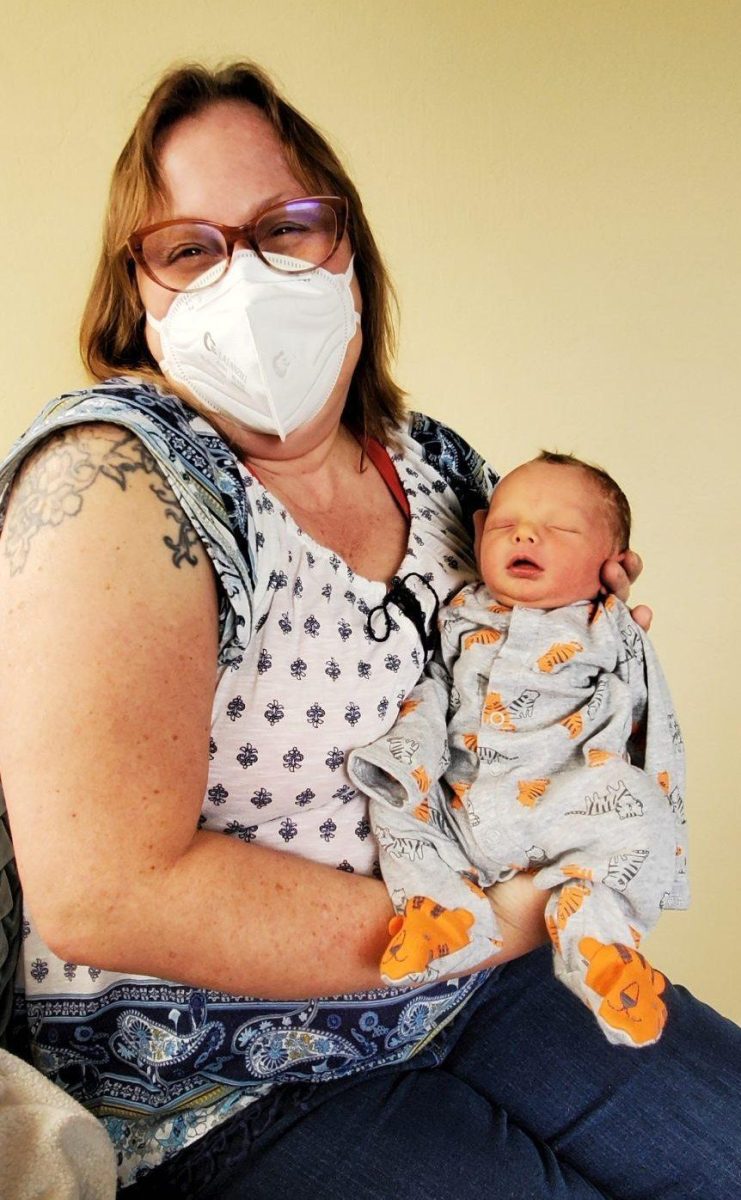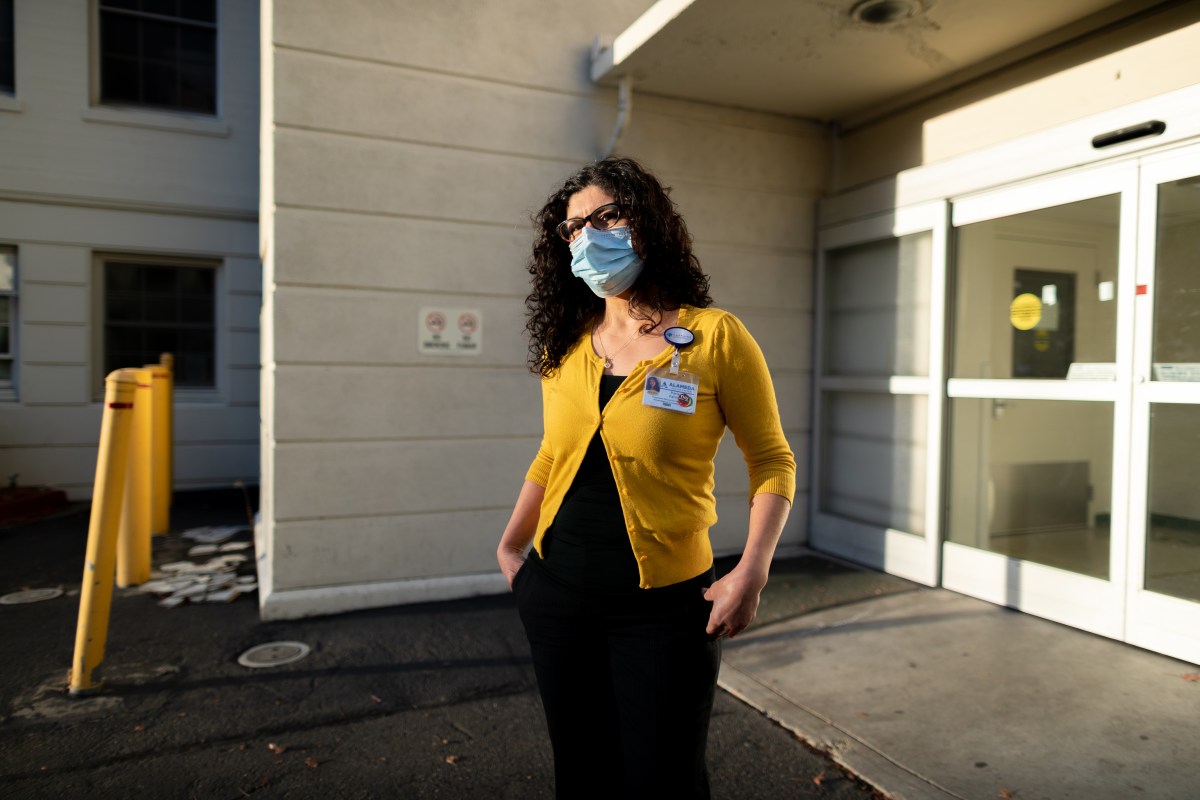With COVID-19 cases at an all-time high in Alameda County, emergency first-responders and hospital workers in acute care settings are poised to become the first people in the county to receive the Pfizer-BioNTech COVID-19 vaccine, beginning this week.
For 10 months, these doctors, nurses, therapists, and firefighters have been providing essential care at considerable risk to their own health. Now that a vaccine is finally here, we wanted to know how they’re feeling about being first in line, how it changes their day-to-day work, and what vaccinations could mean for our communities in Oakland, some of which have been among the hardest hit in the entire county.
We also asked them to speak to the fears and doubts that many understandably feel about a vaccine that was developed with astonishing speed, and why they’re saying yes to receiving it.

Gustavo Gonzalez, Oakland firefighter and paramedic
Gustavo Gonzalez doesn’t shy away from stepping up to the plate. At 30 years old, he’s a firefighter and paramedic for the Oakland Fire Department, president of the Oakland Latino Firefighters Association, a union member of Local 55, and now, he will be among the first people in the county to receive a vaccination against COVID-19.
“I’m honored. Being able to be one of the first to receive the vaccine is extremely important,” said Gonzalez, who is stationed at Engine 13, in the Fruitvale, home to Oakland’s largest Hispanic population. It’s also been among the hardest to be hit by the pandemic. “I’ve seen firsthand every day for the last ten months the devastating effects this pandemic has had on our community,” said Gonzalez, who is Mexican-American. “Sometimes I see five to seven patients a day affected by this when I’m at work.” The emergency has hit close to home. Gonzalez has had friends and family hospitalized because of the virus.
When 911 calls are made in Oakland, first responders like Gonzalez are there to provide what is known as “advanced life support,” tending to various medical needs. “When you call 911, the Oakland Fire Department shows up, no matter what your emergency is.” Afterward, the ambulance crew takes over and transports people to the hospital.
Gonzalez understands why some in Oakland might have doubts about the vaccine, especially in communities that have been harmed by systemic medical racism. “There’s been a lot of misinformation out there, and a lot of this pandemic has been politicized,” he said. “By stepping up to receive the vaccine, I feel like I could set an example and show people that it is a step in the right direction to be able to restore community.”
— Sarah Belle Lin

Allison Austin, triage nurse at Fairmont Hospital in San Leandro
Allison Austin had been working as a triage nurse at Fairmont Hospital for only a few months when the coronavirus reached Alameda County. She was hired to field phone calls from patients worried about all sorts of ailments, and help direct them to the appropriate care team. Now, her job is to listen to people who think they have COVID-19, and determine whether to send them to urgent care, or tell them how they can treat themselves at home.
“We have to do a lot of listening,” said Austin, who speaks daily with many people who are in distress. And her job is tough because there are so many symptoms that could either indicate a viral infection or something entirely different.
Since Austin doesn’t work face-to-face with patients, she’ll get the vaccine after most of her Alameda Health System colleagues. But she believes its arrival will make a big difference for the whole region.
“The idea is to get everyone vaccinated, and get frontline workers who take care of the community vaccinated,” she said. “Most likely it will hopefully diminish the rate of patients hospitalized, that keeps upticking. Right now, we’re struggling.”
It could still be months until the vaccine is available to the general public, however, and health experts continue to stress the importance of masking, social distancing, and staying home whenever possible in the meantime. “There are still some difficult days ahead,” said Austin. “But there’s a bright, shining light.”
— Natalie Orenstein

Serena Meyer, maternity nurse at Kaiser Oakland Medical Center
Serena Meyer is a maternity nurse and a lactation consultant, and you may not think of her as a frontline medical worker during a pandemic. But Meyer has cared for several COVID-positive patients who have given birth. Some chose to be separated from their babies to protect them from infection, or had to be transferred to the intensive care unit because of their symptoms.
Because she works with COVID-19 patients, Meyer will be prioritized for receiving the vaccine in the next few weeks. She said it will be a moment of celebration, and she plans to take a video of herself getting the shot.
Meyer said she has worked with many pregnant and breastfeeding parents who are wary of receiving the COVID-19 vaccine out of fear it may be less safe for them, since the vaccine trials did not include pregnant women. She believes that a lack of data doesn’t mean the vaccine is unsafe or that it will be harmful, and she advises her patients that they should consider taking it when it’s offered to them in the future. She also pointed to guidance from the American College of Obstetricians and Gynecologists saying that vaccines should be offered to lactating and pregnant individuals.
For people who may be skeptical of the vaccine’s safety or efficacy, she recommends that they talk to a health care provider they trust, even if it isn’t their own doctor. It could be a family member or friend who works in medicine. “There’s a lot of fear right now. It’s a really hard time to be a parent,” Meyer said.
The best thing for health care providers to do is offer the information and let patients make their own decisions, she said. “Nobody is mandating this vaccine,” she said. “Being mean about it never helped anybody change their mind. Offering people material so they can weigh the costs and benefits for themselves—that works.”
— Ashley McBride

Ashley Chow, oncology nurse at Kaiser Oakland Medical Center
Ashley Chow, 30, is a Latina oncology nurse who administers chemotherapy to patients with cancer. She’s been doing this work for seven years, two at Kaiser Medical Center in Oakland. “There’s very few nurses that are able to administer chemo in the hospital, and I’m one of them,” said Chow.
During the pandemic, Kaiser has taken added steps to protect highly immunocompromised cancer patients, but some have still caught the virus. “We’re talking about people with immune systems of zero—they have no white blood cells,” said Chow.
Two days ago, the hospital surveyed staff about whether or not they’re comfortable receiving the COVID-19 vaccine. Chow’s answer was a firm yes. “Even though the nurses have a shared collection of fear associated with the vaccine, I think we all decided that in the end, the benefits of the vaccine outweigh the disadvantages.”
Chow empathizes with people who feel nervous about it. “I think the fear stems justly from the amount of time it’s taken the government to produce this vaccine, which is unprecedented,” she said. She made her decision by talking with folks in her social bubble and reading about the science behind the new vaccines in peer-reviewed research papers and references listed by the Centers for Disease Control and Prevention, who have been leading efforts to inform the public about COVID-19.
“If you go to the website of the actual [vaccine] makers, they have their experiments published so you could read about the way they tested their vaccine and the amount of people they tested,” said Chow. “All that information is public, so you can educate yourself in that way.”
At this point, her main concern is the amount of time it will take to get the entire population vaccinated. “There’s a lot of guilt associated with me receiving the vaccine because there’s a lot of people that are way more at risk than me,” she said.
Ultimately, her decision felt like an extension of her duties as a healthcare provider. “The likelihood of me surviving COVID is a lot higher than my patients,” said Chow, who won’t be visiting family for the holidays this year. “So literally every decision I make is to not harm the people that I take care of.”
— Sarah Belle Lin

Parisa Farrohi, therapist at Fairmont Hospital in San Leandro
As a therapist working in an outpatient program at Fairmont Hospital, Parisa Farrohi serves “the most vulnerable population of Alameda County.” Her patients are experiencing severe mental illnesses, like schizophrenia, and she treats them in an unusual daytime group program, an “in-between step” for people who need more than basic case management, but who don’t need to be hospitalized. Her patients have lower incomes and rely on the safety-net insurance program Medicare.
Farrohi believes she’ll be among the “second tier” of Alameda Health System employees to get vaccinated, after her colleagues who work in emergency settings. She’s ready. “I’m definitely getting it as soon as it’s available because I need to show up and continue to advocate on behalf of our patients,” said Farrohi, a single mother of two who worries about getting infected at work.
She’s excited, too, for the day when her patients can get vaccinated. “It will allow them to access resources in the community, and that connection we all need as humans,” she said. But she knows there will be hurdles, since many of her patients are fearful of going to the doctor and often need a trusted advocate there.
Adding to the stress of this year is the looming potential closure of the intensive outpatient program where Farrohi’s worked for 19 years. The AHS administration’s recently announced plan to close the program was devastating news to Farrohi, who said it “keeps patients out of the hospital” and teaches them the skills they need to cope with daily life. Farrohi said that she and her colleagues—who pleaded with the AHS board this week to continue their program—are often able to identify medical needs that would go unnoticed if their patients didn’t have access to a therapist.
Farrohi’s own mental health suffered at the start of the pandemic. An Iranian immigrant, Farrohi came to the U.S. at age 13 after growing up amid war and revolution, and traumatic experiences like pandemics can trigger her PTSD. So the therapist knows that while a vaccine will hopefully eradicate the physical risk of catching the virus, many people will be dealing with psychological ramifications long after immunity is established.
“How this pandemic is impacting our mental health is not looked at as much,” she said.
— Natalie Orenstein
